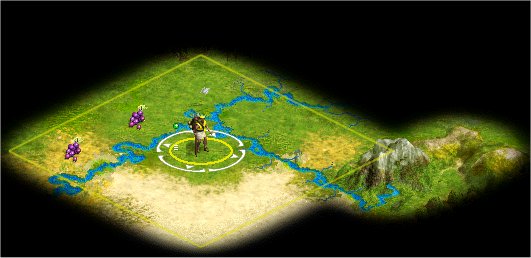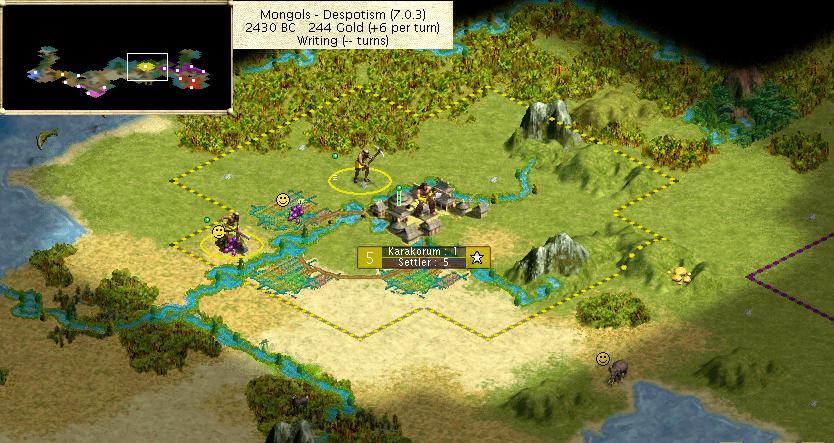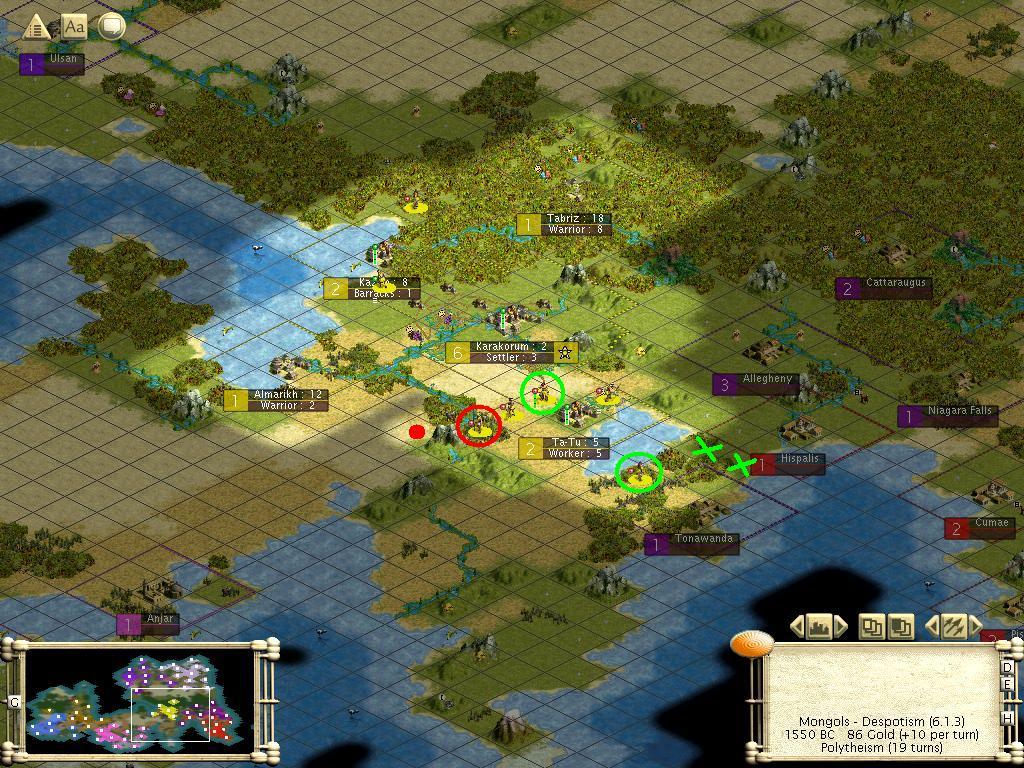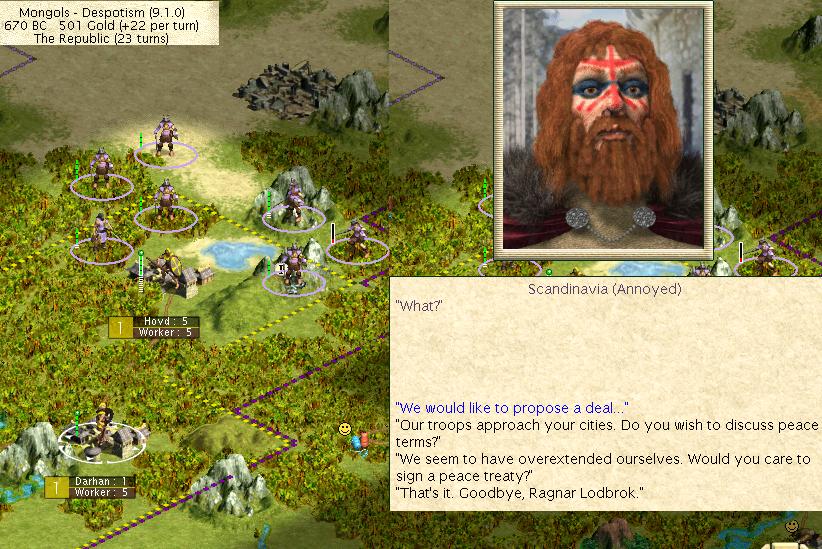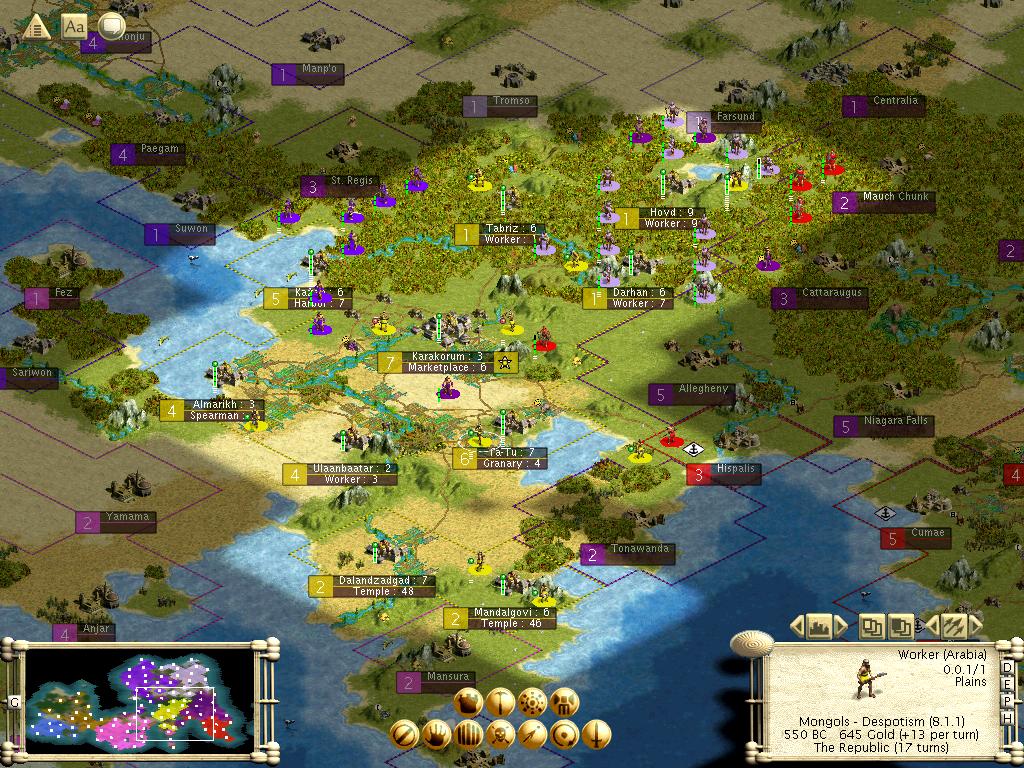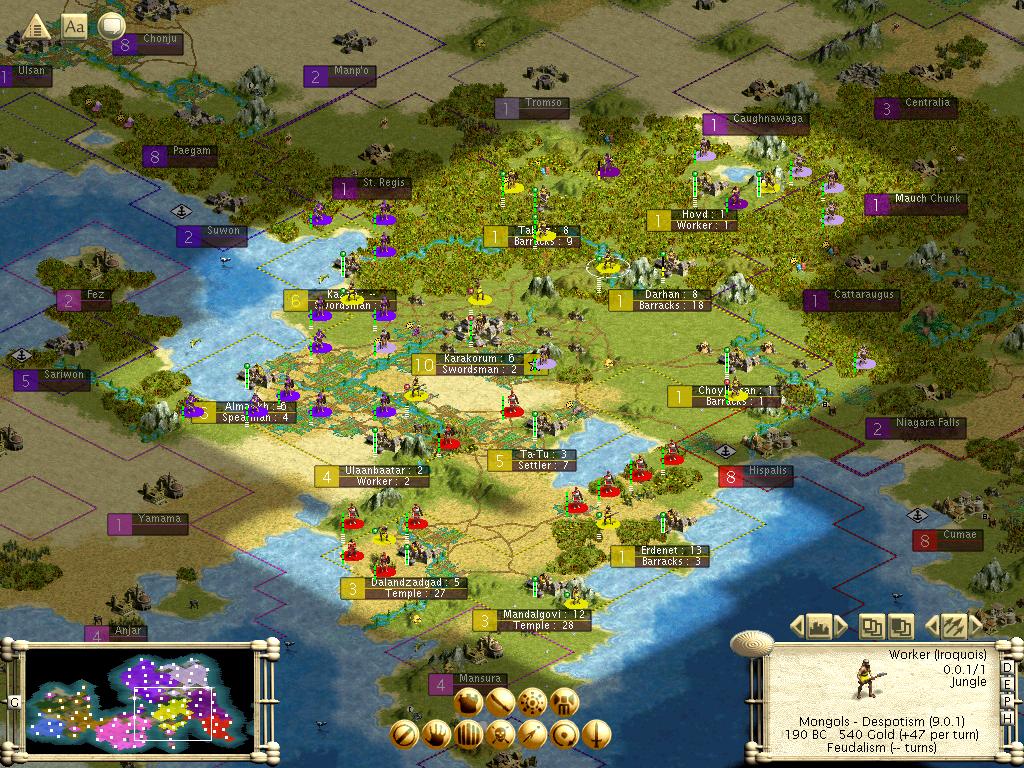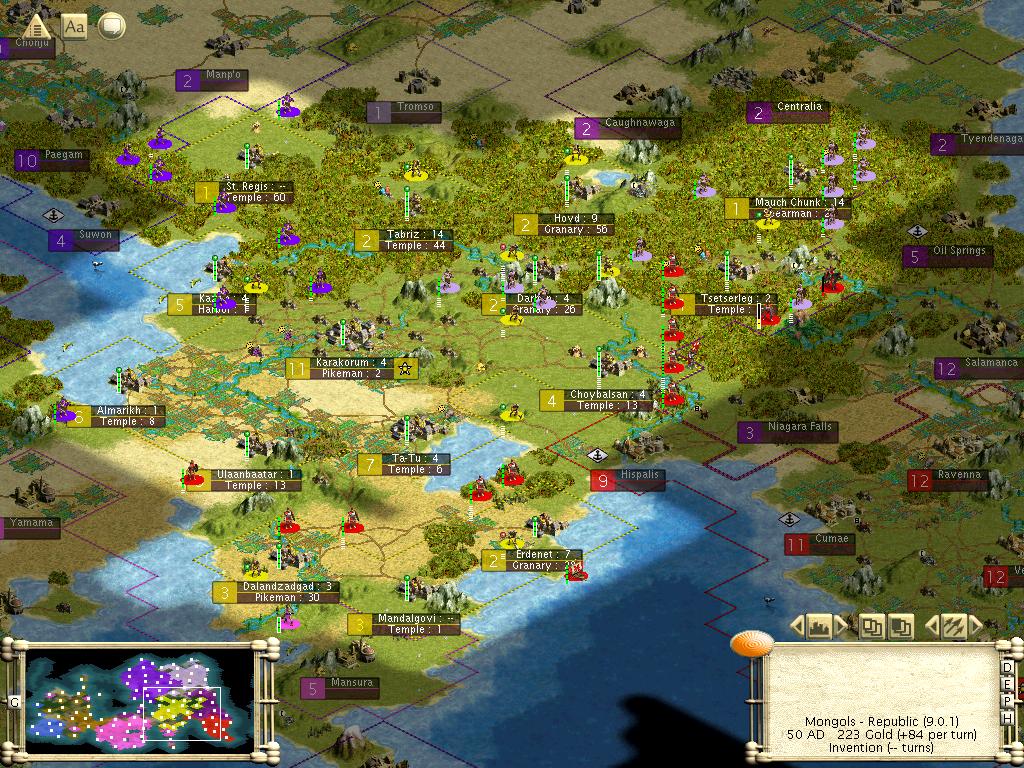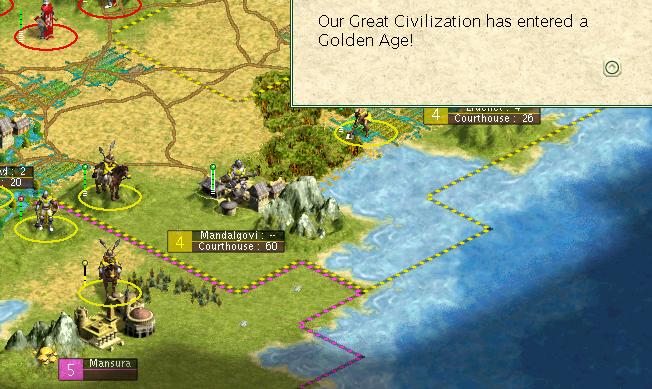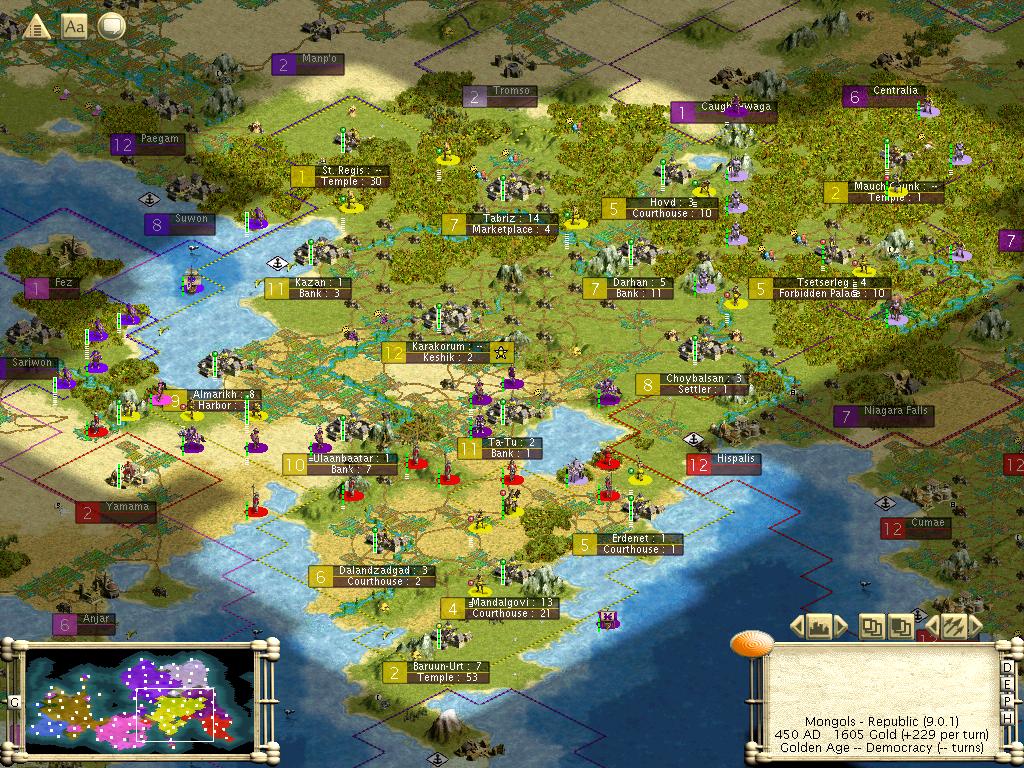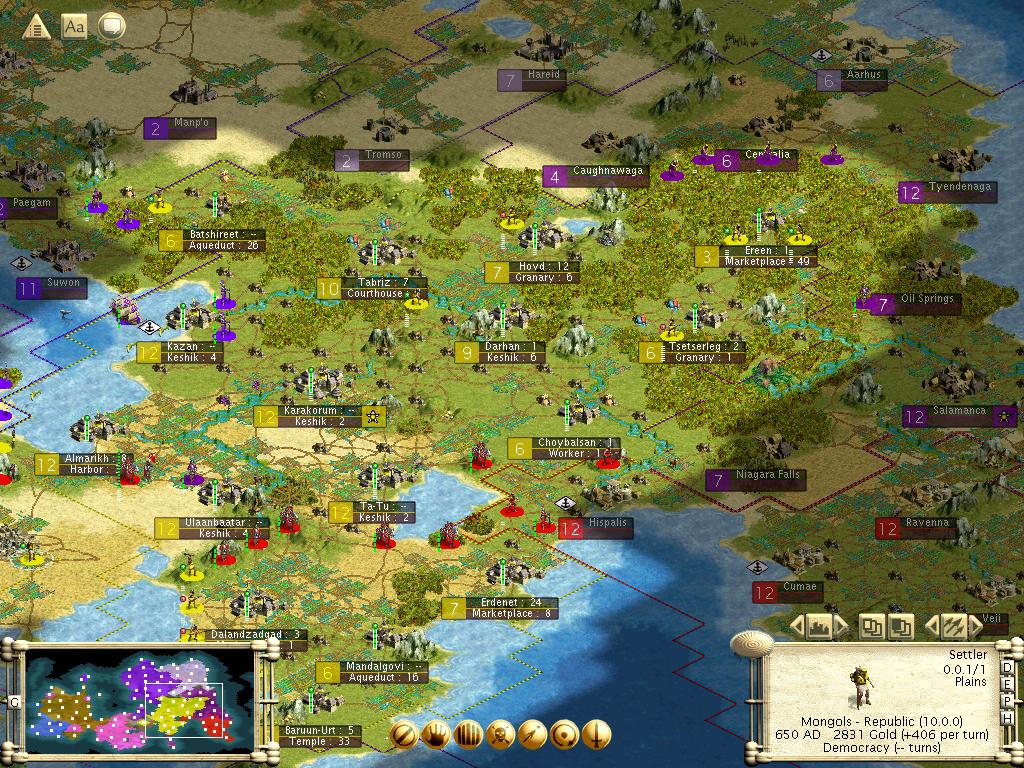"A Distraction"
Written by Sullla
A soft but steady rain continued to fall on the streets of Karakorum on this dark evening, grey clouds blocking out the ordinarily reassuring gleam of the moon and stars. The torches that normally illuminated the streets burned fitfully, struggling to shed their glow against the mist and the rain of this night. It was as dark as midnight, though the hour was not late, and a number of shadowed figures hurried through the roads of the city, huddled up under thick cloaks to keep out the water, eager to be done with their final business of the day so they could get home to family and a warm fire. There was nothing to distinguish one person from any of the others as he stomped through the muddy lanes, dodging between the stalls of market vendors and the occasional merchant's cart loaded down with goods; nothing to suggest that this man was any different from a hundreds others walking through the streets on that miserable night. It was a demeanor that this man carefully cultivated - for staying out of sight and avoiding notice by blending into the mass of ordinary people that choked this city was what he did best. As he passed by the sputtering light of a pitch torch, the figure raised his head for a moment to gather his bearings, revealing a face that few would recognize. A face unknown outside the very highest councils of the Mongol government. The face of Jochi, second son of Ghengis Khan Temujin.
Unlike his brothers, widely publicized to the Mongolian people and the rest of the world at large, Jochi was almost a total unknown to all but the most senior and trusted members of Temujin's government. It had not always been so; in the past, he had sat in the highest councils and been seen as a quiet and reserved supporter of the khan's actions. Change had come of Jochi's own initiative; he had approached Temujin privately and asked to disappear totally from public life. For Jochi knew that he was no commander of soldiers like his older brother Ogodei, or a master diplomat like his younger counterpart Chagatai; his particular talents lay in staying hidden and out of sight where he could do his best work. And so Jochi had simply fallen off the face of the earth as far as the public was concerned, with no explanation given as to what had happened to him. Most foreign observers simply assumed that Temujin had had him killed out of hand, which fit with their view of how the unpredictable khan's mind operated. What they didn't know was that Temujin never disposed of a tool that still had potential value; far from being dead, Jochi had disappeared from sight in order to serve a far greater purpose as the khan's highest and most respected spymaster.
It was all so ingenious, Jochi reflected to himself as he traversed the dark pathways of the Mongol capital. With no one suspecting who he was or his connection to the khan, he was free to go out among the people and determine their mood from a highly critical perspective. His information had warded off potential revolts innumerable times through the preemptive arrest of troublemakers or extra pay being given out to disaffected soldiers. And it was not just domestic disturbances that Jochi handled; he was frequently abroad passing incognito in foreign cities trying to probe for weaknesses where Mongolia could strike. He was the one who had spotted the inherent flaws in the Iroquois military which had enabled the last successful war, the decentralized command structure used by Hiawatha which made orders from the high command slow in reaching the military forces in the provinces. Striking with surgical precision, the Mongols had snipped out a number of outlying Iroquois cities before their forces had been given sufficient warning and concluded a highly favorable peace treaty before the bulk of the Iroquois military could be brought into the fight. Returning now from his long journey to the south, Jochi was bringing back news to Temujin on how the same principles could be applied again to good use.
Of course, no one could traverse the winding and twisted paths of espionage without being sorely tempted at times to use the information gathered for personal gain. Jochi knew full well how dependent on his advice Temujin was, and relished the small power that it gave him over the almighty khan. Certain words whispered in the right ears at the right time could bring about anger, mutiny, or rebellion. Mongolia was a place where only the strong survived, and while Temujin was in full control of the situation at the moment, that might not always be the case. Should the khan falter and fail... well, suffice to say, Jochi was ready to exploit the situation to its fullest. No matter what happened, he always saw a way to profit from the latest distraction, whether the khan met with success or failure.
Jochi's weathered face cracked a thin smile as he entered the palace unobtrusively, the closest it ever got to a grin.
He made his way through the massive halls of stone, considerably enlargened since the ancient early days of the state, and up towards Temujin's private study. He was stopped numerous times by guards wondering who the bold visitor was; each time, Jochi produced a letter from the khan bearing his personal seal and was admitted without question. Part of the reason why Jochi spent so little time at the palace was to keep the tongues of servants and guards from flapping over his identity, but tonight's information was important enough to override such concerns. Finding the chamber he wanted in the same place it had been the last time he had visited, Jochi was admitted past the guards and went inside.
Temujin sat behind his massive desk reading a report from a stack of papers. He was wearing a thin pair of spectacles to help him read in the faint candlelight - something the khan would NEVER let the public see and which would certainly be covered up at all costs. Another fact that Jochi filed away in his head for future use should the need arise. At the sound of the door opening, Temujin glanced up to stare at his visitor, removing his eyewear automatically as though it had become second nature. Jochi came to stand in front of the desk before his sire; there was no chair, of course, not that there ever had been one in Temujin's study for visitors.
"Well?" prompted the khan unceremoniously. Neither man was the sort to waste time with greetings or other plesantries, so despite the fact that Jochi had been out of the country for the last year and a half the audience began immediately.
"You were right. The strike should go forward as planned," answered Jochi in his dry, gravelly voice. "Masura is almost completely undefended, or it was just a matter of weeks ago, and it won't be able to offer more than token resistance for our forces."
"Good, good..." said Temujin, his face lightening into a faint smile. He was the one who had seen the potential for a lightning military strike and sent Jochi to investigate it, although most of his highest aides had considered it out of the question when broaching the subject. Temujin's expression became serious again. "But tell me, what of the western border? Are we strong enough to fight off a counterattack from that direction? Explain to me how the Romans will fit into the whole equasion."
"The Romans? The presence of the Romans is a godsend," laughed Jochi lightly. "The legions are so busy fighting with the Arabs that it's unlikely we'll see any kind of action at all in the west. They'll keep the heat off of us better than a wall of fortresses from sea to sea. But just to be prudent," he went on, "you'll want to have some forces in the area to deal with trouble should it rear its head. You have been moving forces discreetly into the area from the east, haven't you?" Jochi raised an eyebrow at the other man.
"Naturally," Temujin grumbled back. "What do you think I am, a fool? For all your talents you forget yourself sometimes Jochi. Never forget that you are nothing without me, do you understand?" The khan was staring Jochi right in the eye, fixating him with that gaze that no one could meet successfully. "Never presume to tell me what to do. I repect your opinion and enjoy your advice, but you must know your place. Do you hear me?"
Temujin waited for Jochi's nod of assent before continuing. I'll follow your every word for now, Father, thought the younger man. That is, until you make a fatal mistake and give me the opportunity I need.
The khan was speaking again: "Now you've spent the last few months poking around the areas involved, tell me who you think should have the command in this operation."
Jochi had expected a question along these lines and was already prepared with his answer. "You should give Ogodei the command in the south, and let Magdalai handle things in the west," was his brief response.
Temujin raised his eyebrows in surprise. "Magdalai? He's an impressive soldier, but full command in the west? Explain your reasoning."
Knowing he would be asked this as well, Jochi was ready to do so. "The campaign in the south will be short and brutal, nothing more than plowing over a lightly defended settlement with superior forces. It's exactly the sort of engagement which suits Ogodei's bullish style of military command. Put him in front of an army and the man's an impressive general, but he has no sophistication whatsoever. Ogodei can't see anything beyond the next cavalry charge, and how much military glory it will bring."
"Go on," prompted Temujin when Jochi stopped for a moment to gather his thoughts. He had essentially the same view of his first son, but wanted to see the rest of Jochi's reasoning.
"We both know that things in the west will be more complicated," began Jochi. "We'll be dealing with an army considerably larger than our own and within easy striking distance of some of our most populated and important cities. The general out there will have to conserve our forces and do nothing more than defend the border. Furthermore, he will have to work with the Romans and aid them as much as possible while maintaining the fiction of neutrality in the Roman/Arab conflict. Magdalai is intelligent enough to carry out that sort of duty; Ogodei would simply grab all available forces and charge for the nearest enemy city."
Temujin chuckled to himself; that was Ogodei, alright. Jochi continued: "The west is where the measure of this war will be determined, whether it will be short and successful or turn into a disastrous protracted affair. But there will be no glory in the west, so the command must be given to someone who will be satisfied with simply getting the position and not feel the need to make a name for themselves. From what I have heard, Magdalai is ambitious enough to want the job and has been a soldier long enough to avoid seeking out unwanted conflict. Now think about Ogodei," he went on, "who'll have essentially a ceremonial role in the whole thing. An easy military victory for him, which you can then celebrate to the common people and keep them happy. It will showcase the invincibility of the Mongol ruling family to the world, and provide a distraction for the people from their miserable lives."
"Hmm... what you say makes good sense," said Temujin slowly. He was starting to get a vision of what this could be; a short and victorious war could serve as a wonderful distraction to keep his country happy. For the people didn't care if their standard of living was lower than the rest of the world, if their rights were being taken away more and more to fuel even greater power for the khan, if the burden of taxation was growing greater with every year - no, in the end they were more interested in the military triumphs and great parades of captured foes that Temujin celebrated with every successful war. Yes, he could fete the victors in such a war to the skies, make a huge deal out of his new keshik warriors; possibly even make it seem as though the victory initiated a new "golden age" for Mongolia. And perception was so close to reality, if the people BELIEVED that it was a golden era for his nation, then perhaps it would be. Indeed, this war could be just the distraction he needed.
Of course, Temujin knew, there was the danger (nay, near certainty) that Jochi was maneuvering him for his own gain. What that could possibly be the khan didn't know, but he could suspect at what the other man wanted. After all, who had more power than he did? "Good work Jochi, you're free to go wherever it pleases you for the next few weeks. I'll contact you when I next need your services again." Jochi bowed, and prepared to head out. Before he did, however, Temujin offered him one final piece of advice. "Keep this in mind as you go, boy: don't try whatever it is you're planning." The only sign that Jochi gave away was a slight tick of his eye, but Temujin noticed it all the same. "The day you try to turn on me is the day you die, regardless of who's son you might be. Don't do anything stupid and I'll make sure your 'disappearance' isn't permanent, got it? Now get lost, I have work to do."
Outwardly Jochi gave no sign that the words had had any effect at all on him. Inside his head, however, was a maelstrom of raging emotions. He had known! Somehow he knew that Jochi was secretly plotting against him. It didn't make any difference at the moment; he would just have to continue serving Temujin as he had done for years and years. But someday it will be different, Jochi snarled inwardly, Sooner or later you will leave yourself exposed, old man, and when that time comes I will make sure than nothing distracts me from taking your place.
He stepped out of the palace into the pounding rain, one more unremarkable face among hundreds of thousands.
